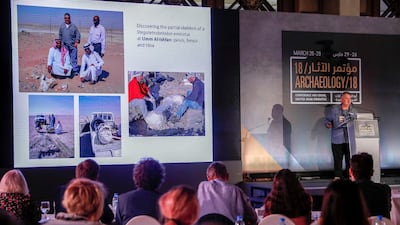Believe it or not, elephants once roamed Abu Dhabi and in the past two years, three new elephant trackways have been uncovered at sites in the Al Dhafra region – bringing the total to six overall.
The remarkable finding came at the start of Archaeology/18, a four-day conference attracting distinguished archaeologists from the UAE and across the globe, which kicked off in Al Ain on Monday.
Travel back about eight million years to what’s known as the Late Miocene epoch and the large mammals walked the ground that we do today. The new track discoveries are some of the best preserved and most extensive of their type in the world.
Partial fossilised elephant skeletons have also been unearthed recently and it’s hoped to open these sites to the public in the future
In 2012, a team of scholars from Germany, France, the United States and the UAE, published findings in a journal by The Royal Society of the oldest-known evidence of how prehistoric elephants interacted socially garnered from another Abu Dhabi trackway, Mleisa 1. This is also one of the largest trackway sites in the world, covering an area of five hectares.
This week's conference aims to reveal new discoveries that have been uncovered at sites in the UAE, highlight conservation methods and examine how life here thousands of years ago relates to our modern way of living.
Video footage in the conference hall showed flickering images of early archaeological investigations in Abu Dhabi in 1959 and to mark this year's Year of Zayed, the conference will also reflect on the Founding Father's role in advancing archaeological investigations in the UAE.
Dr Peter Magee is head of archaeology at the Department of Culture and Tourism – Abu Dhabi, which organised the conference.
"The main aims of the conference are to discuss and present the very latest archaeological discoveries in the UAE – many of which are fundamentally changing our perception of ancient life in this country," Dr Magee told The National.
“So far, there is new and important evidence for trackways of a type of elephant from six to eight million years ago. These provide really unparalleled insights into the herding and habits of these very early animals at a time when Abu Dhabi was completely different in terms of environment,” he said.
On Monday, recent discoveries on Marawah Island, off the coast of Abu Dhabi, were also revealed. Excavations carried out between 2015 and 2018 have provided new insight into a Neolithic settlement dating to 6,000BC along with many rich finds such as arrowheads, shell beads and vessels embellished with decorative work.
"It's revealed stunning evidence, really game-changing evidence, in how we understand that period not just here but more broadly throughout the Middle East," said Dr Magee, of the work on Marawah.
Other topics on Monday included details about a community of Neolithic camel hunters in the Baynunah region southwest of Abu Dhabi. This area has provided evidence for the first ever “kill site” in the Arabian peninsula, where more than a hundred camels were hunted. The site was discovered during the construction of an oil pipeline in 2003.
Meanwhile, the creation of the Abu Dhabi Islands Archaeological Survey by Sheikh Zayed is the subject of a talk by historian Peter Hellyer on Tuesday. On the same day, German archaeologist Kristina Pfeiffer and Salah Hassan, head archaeologist at the Fujairah Tourism and Antiquities Authority, will talk about their recent excavation in the emirate. A treasure trove of objects has been unearthed from tombs there in the past few months.
Wednesday's session, meanwhile, will hear about conservation efforts in the UAE, such as the project to revitalise pearling village Jazirat Al Hamra in Ras Al Khaimah, and from Dr Joseph Elders about the Christian monastery on Sir Bani Yas. Dr Elders is chief archaeologist for the Church of England, and he directed excavations at the monastery from 1993 to 2012. He will talk about the expansion of the monastery, which was believed to have been founded around 600AD, and its “disorderly decline”.
“To understand our present and to plan for the future, we must first understand the past,” said Saif Ghobash, director general of the DCT.
“As we look back on the history and archaeology of the UAE, we see the wealth of culture and heritage of Abu Dhabi. We look at the elements that are very local, such as the pearl industry, the creation of the falaj, the architecture that is symbolically Emirati and the ties to trade with the communities along the Arabian Gulf. There is so much to learn and explore.”
_______________
Read more:
Remains of Bronze Age Emirati settlement open to public for first time
Elephant tracks discovered in Abu Dhabi provide world's oldest evidence


